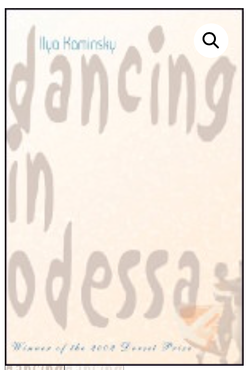Dancing in Odessa*
by
Ilya Kaminsky
My beloved mother-in-law, Rachel's, Jewish family came from—in or around—Kyiv. when it was subsumed into Russian territory. (Sadly she is no longer with us to correct my vagaries.) The story is that the family left for the US when her father was asked to join the Russian (Czar's) army: "You people have visited too many pogroms upon our people," he was supposed to have said. He was also too far to the left for the politics of the country, then under pre-Soviet Russian rule.
Such connections, I am not even sure how—such connections make the current events in Ukraine seem even more immediate.
Now, I would hope that readers rightly appalled by the current, scorched earth policies of the Russians in the Ukraine do not so easily lump enemies according to broad categories of ethnicity or nationality. For, clearly, many Russians are unhappy with this sad turn of events, not to mention its brutal instigator Putin. To wit: Poet Ilya Kaminsky, who is Russian by ethnicity, was born in Odessa, and came to the US with his parents in 1993; his latest book, Dancing in Odessa—a modest, chapbook-length volume of 56 pages—is being published by Tupelo Press with the announcement,
In solidarity with Ukraine, we are donating 100% of the profits on sales of Dancing in Odessa by Ilya Kaminsky to the Ukraine Crisis Relief Fund.
The cause is worthy, and so is the book; and Tupelo's announcement rightly blurbs the book thus:
|
Impossibly young, this Russian immigrant makes the English language sing with the sheer force of his music, a wondrous irony, as Ilya Kaminsky has been deaf since the age of four. In Odessa itself, “A city famous for its drunk tailors, huge gravestones of rabbis, horse owners and horse thieves, and most of all, for its stuffed and baked fish,” Kaminksy dances with the strangest — and the most recognizable — of our bedfellows in a distinctive and utterly brilliant language, a language so particular and deft that it transcends all of our expectations, and is by turns luminous and universal.
|
Kaminsky's music is no less because he is deaf. "When I lost my hearing, I began to see voices," he writes in "Dancing in Odessa" and, immediately, I am reminded of the operations of synesthesia, that convergence of senses, of one sense being the conveyance of another. Or more. So, too, with the emergence of stories, those of childhood memory, those of terror, betrayal, and, as he names the poem, "in Praise of Laughter," whose tale is
...in the secret history of anger--one man's silence
lives in the bodies of others—as we dance to keep from falling.
Most importantly is the poet's insistence that one must continue to tell and retell our stories, ones that must contain,
all our words, heaps of burning feathers
that rise and rise with each retelling.
We have listed this book as a "Summer Read," on the premise that such reading is no less serious than that of any other book you may wish to take with you, should you be off work or slogging along in the trenches of vocation instead—books read, not as a "panacea," or some form of anodyne, but as a means to keep those stories alive.
...in the secret history of anger--one man's silence
lives in the bodies of others—as we dance to keep from falling.
Most importantly is the poet's insistence that one must continue to tell and retell our stories, ones that must contain,
all our words, heaps of burning feathers
that rise and rise with each retelling.
We have listed this book as a "Summer Read," on the premise that such reading is no less serious than that of any other book you may wish to take with you, should you be off work or slogging along in the trenches of vocation instead—books read, not as a "panacea," or some form of anodyne, but as a means to keep those stories alive.
— Bronwyn Mills
* The Press also offers a series of free lesson plans for teachers of various literatures which might be relevant.
